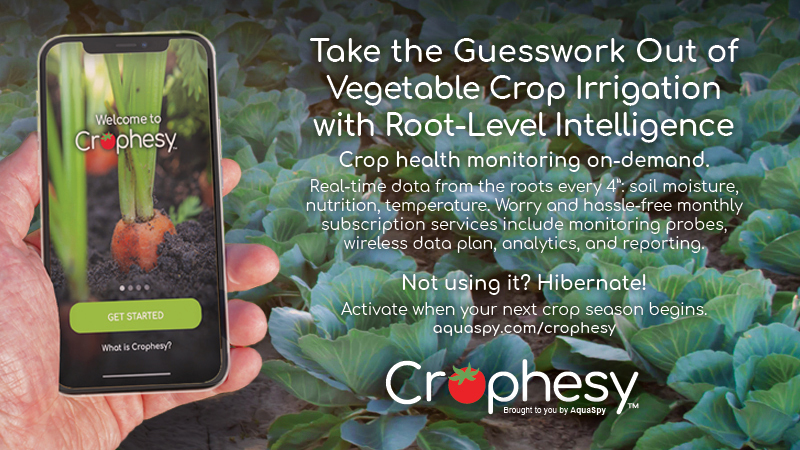Meet The Next Generation Of Ag Researchers
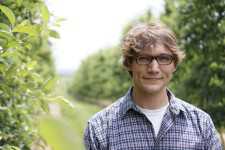
The May issue of American/Western Fruit Grower featured the launch of our GenNext Growers program (www.GenNextGrowers.com), which is designed to provide the coming generation with the tools they need to improve their skills on and off the farm, and a network where they can share ideas. While the program is mostly focused on next-generation growers, every segment of the industry has a stake in its future. This month, we hear from some of the new faces in university research and Extension. Many of these individuals are already working side-by-side with growers, helping them navigate production challenges and developing potential solutions for them.
Tom Kon, Pomology Ph.D. Candidate, Penn State University
• While I have a research-based assistantship, I am actively involved in Extension programs at Penn State. I have given several grower presentations based on my research projects.
• I am a Ph.D. candidate in horticulture with an emphasis
in pomology. My work to date focuses on crop load management of apples. I researched the use of the Equilifruit disc as a hand-thinning gauge in 2009 before starting my thesis on mechanical thinning of apples with the Darwin string thinner.
• I got hooked on horticulture in a plant propagation course during undergraduate work at the University of Nebraska. I became especially interested in fruit and nut crops at Nebraska, and this influenced my decision to study pomology at Penn State University.
• Most of my interactions with growers have occurred in their orchards, at Extension meetings, and through online newsletters. When possible, I prefer face-to-face communication.
• One of the most pressing challenges facing growers is a consistent source of labor. I am very fortunate to be part of a team that is proactive in developing and testing new technologies to increase labor efficiency and automate orchard practices.
• I would like to help develop sustainable and consistent blossom thinners for apples, and increase our body of knowledge regarding pruning of high-density apple and peach systems. Both of these research areas have potential to improve existing horticultural practices, reduce labor costs, and increase crop value.
• While technology has markedly enhanced the rate of dissemination of information to our growers, it is also important to stay true to the core values of agricultural Extension. Extension should continue to develop information technologies, but there is nothing that will replace “boots on the ground” Extension.
Nikki Rothwell District Horticulturist, Northwest Michigan Horticultural Research Station, Michigan State University
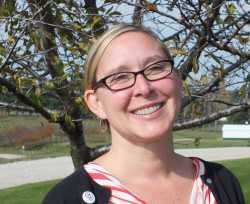
• All of the information we provide growers needs to be developed here and with our colleagues around the country. We really try and focus on the needs of the growers, which is why our research station is perfectly situated in the heart of cherry country. Our research projects and therefore our educational programming is driven by the issues in the field. We like to think of the research station as a liaison between campus and the orchard, and with this collaborative approach, we have been pretty successful at keeping both the research and Extension relevant.
• I think most people think of me as the tart cherry person, which is probably the biggest focus of my research and Extension duties. However, I do work with sweet cherries, apples, and to some extent on winegrapes. I am an entomologist by training, but spend probably equal time on entomology, plant pathology, and horticulture.
• I grew up on a small beef cattle farm where my dad farmed on the side of his teaching job. I am not sure that cows helped prepare me for the fruit business, but the dedication and hard work of farmers, regardless of what they are growing, is ubiquitous across all crops or livestock.
• During the field season, we send out information to growers several times per week; growers can receive this information via email or fax. I also hold IPM Updates each week in a classroom/discussion type of communication. I just set up a Twitter account (@NWMHRS), and I tweet out timely information multiple times per day.
• We always are trying to keep our growers on the cutting edge, so we spend winters writing grants to support research that will help keep growers competitive into the future, such as modern horticultural systems, new varieties, and new technologies.
• Growers that produce apples and cherries rely on university and Extension for their information. Not too many companies specialize in tart cherry production. I also like to think of our jobs in Extension as a two-way street, making sure we are engaging our growers to identify their current and future needs, and then taking that information and developing research and educational programming to support agriculture in our region, state, and throughout the country.
Kerik Cox Plant Pathologist, Cornell University
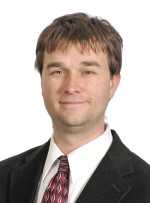
• Most of my research is based on Extension and grower needs. If a grower has a question or concern about a product and how it will work with pathogens and resistance, I focus and build research projects around it.
• Most of my work is in disease management, pathology, and biology. Is this pest or pathogen population resistant, and will a grower’s management practices still work?
• Outside of my education, I don’t have a farming background. My parents were educators, so I had a teaching background.
• I am focusing more of my research on fire blight and organic apple pest management, as well as nailing down fungicide resistance concerns. I am also getting involved in emerging pest concerns, such as apple proliferation phytoplasma from Canada. It’s causing problems, so we may have to get involved.
• There seems to be fewer people in Extension, yet more needs for programming. We can’t give up grower contact, so webinars have become more popular. We can have direct contact with growers, yet no one has to go anywhere.
David Doll Farm Advisor, Merced County, University of California Cooperative Extension
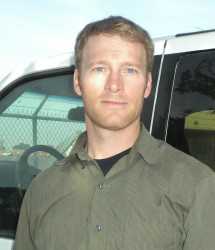
• Most of my research begins with a problem experienced in the field, a question from a grower, or the downstream effect of a newly passed regulation — not necessarily a new idea that I have created. Without having contact with my clientele, I wouldn’t have much of a research program.
• I am responsible for almonds, pistachios, and walnuts in Merced County, CA. This represents about 120,000 acres of specialty crops. I have the luxury of having both small (less than 5 acres) and big (more than 1,000 acres) farms, both of which possess their own set of challenges.
• I was raised on a small fresh fruit farm in southeastern Indiana. It was there that I learned my curiosity for plants, respect for farmers, and interest in agriculture.
• I attempt to use all channels of communication. This includes field visits, phone calls, presentations, and meetings, as well as electronic. “Kicking clods” in the field is by far my most preferred method, but I am probably most known for starting and establishing the “The Almond Doctor,” a weekly updated website covering issues within almond production.
• Helping farmers determine risk factors associated with the weather is critical in day-to-day pest and disease management decisions. What may seem like a small difference can mean a big change in practices. In irrigated agriculture, water is always an issue, so helping farmers with better irrigation management as well as better use efficiency will always be needed.
• I have always been interested in finding ways to reduce tree variability within the field. From tree planting to orchard removal, maintaining uniform tree size is difficult and is influenced by many issues including soil, disease, etc. We have some tools to help with these problems, but figuring out how to use them most effectively is the next step.
• There aren’t many institutions left that are able to conduct long-term studies on crop production. I see this as a major role of Extension in the future.







